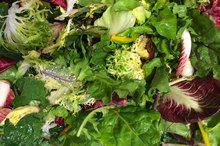Food to Help Muscle Spasms
A muscle spasm is a painful, sudden tightening of muscles that occurs during physical activity. You're more likely to have muscle spasms if your diet is deficient in calcium and potassium or if you're dehydrated. Magnesium is also important for muscle relaxation. Eating foods that contain these minerals might help reduce the occurrence of muscle spasms. Speak to your doctor if you have frequent or severe muscle spasms.
Calcium-Rich Foods
Calcium is essential for muscle and nerve function so that muscles contract and relax properly. According to the National Institutes of Health's Office of Dietary Supplements, most adults need 1,000 to 1,200 milligrams of calcium each day 2. Dairy products such as milk, cheese and yogurt are all high in calcium. Sardines, tofu and calcium-fortified orange juice and breakfast cereals, turnip greens and kale are also good sources of calcium.
- Calcium is essential for muscle and nerve function so that muscles contract and relax properly.
- Sardines, tofu and calcium-fortified orange juice and breakfast cereals, turnip greens and kale are also good sources of calcium.
Potassium-Rich Foods
Are There Foods That Are Muscle Relaxants?
Learn More
Potassium works with calcium for normal nerve and muscle function. According to the Institute of Medicine, most adults should get 4.7 grams of potassium from foods every day. Potassium is found in a variety foods, but most Americans don't get enough. Most fruits and vegetables are high in potassium, especially potatoes, sweet potatoes, cooked greens and bananas. Nonfat milk, yogurt, chicken and fish are also rich in potassium.
- Potassium works with calcium for normal nerve and muscle function.
- According to the Institute of Medicine, most adults should get 4.7 grams of potassium from foods every day.
Foods High in Magnesium
Magnesium helps your muscles contract and relax. According to the Institute of Medicine, women need between 310 and 320 milligrams per day, depending on age, and men need between 400 and 420 milligrams each day. Pregnant woman need between 350 and 400 milligrams every day. Dark leafy green vegetables are the best source of magnesium.
- Magnesium helps your muscles contract and relax.
- According to the Institute of Medicine, women need between 310 and 320 milligrams per day, depending on age, and men need between 400 and 420 milligrams each day.
Hydrating Foods
Foods for Leg Cramps
Learn More
Your body needs water to transport nutrients to cells and to remove waste from the cells. According to the Institute of Medicine, adults need about 2.8 to 3.9 quarts of water every day. All beverages, soups and broths contain water and so do many foods you eat, especially fresh, watery fruits such as:
- oranges
- tomatoes,
- watermelon
Not everyone agrees that water intake is connected to cramps, however. According to a study published in 2013 in "The British Medical Journal," the level of hydration had no effect on exercise-induced muscle spasms. The study also stated that other factors such as neuromuscular control might be more important in the onset of muscle cramps 1. So if you're adequately hydrated and consuming enough electrolytes, frequent muscle cramps may be due to something else 1.
- Your body needs water to transport nutrients to cells and to remove waste from the cells.
- According to a study published in 2013 in "The British Medical Journal," the level of hydration had no effect on exercise-induced muscle spasms.
Related Articles
References
- MedlinePlus.com: Muscle Cramps
- Office of Dietary Supplements: Dietary Supplement Fact Sheet: Calcium
- British Journal of Sports Medicine: Significant and Serious Dehydration Does Not Affect Skeletal Muscle Cramp Threshold Frequency
- MedlinePlus.com: Magnesium in Diet
- Institute of Medicine: Daily Reference Intakes: Elements
- Aburto, et. al. Effect of increased potassium intake on cardiovascular risk factors and disease: systematic review and meta-analyses. BMJ. 2013 Apr 3;346:f1378. DOI: 10.1136/bmj.f1378.
- Appel LJ, Moore TJ, Obarzanek E, et al. A clinical trial of the effects of dietary patterns on blood pressure. DASH Collaborative Research Group. N Engl J Med. 1997;336(16):1117-1124.
- Ferraro PM, et. al. Dietary Protein and Potassium, Diet–Dependent Net Acid Load, and Risk of Incident Kidney Stones. CJASN. October 2016, 11 (10) 1834-1844; DOI: 10.2215/CJN.01520216
- Granchi, D, et. al. Potassium Citrate Supplementation Decreases the Biochemical Markers of Bone Loss in a Group of Osteopenic Women: The Results of a Randomized, Double-Blind, Placebo-Controlled Pilot Study. Nutrients. 2018 Sep 12;10(9). pii: E1293. DOI: 10.3390/nu10091293.
- Linus Pauling Institute. Potassium.
- Macdonald, HM, et. al. Effect of potassium citrate supplementation or increased fruit and vegetable intake on bone metabolism in healthy postmenopausal women: a randomized controlled trial. Am J Clin Nutr. 2008 Aug;88(2):465-74.
- National Institute of Health. Office of Dietary Supplements. Potassium.
- The American Academy of Orthopaedic Surgeons. Muscle cramps. Updated June, 2017.
- Bordoni B, Sugumar K, Varacallo M. Muscle cramps. StatPearls. Updated June 22, 2019.
- Schwellnus MP. Cause of exercise associated muscle cramps (EAMC)--altered neuromuscular control, dehydration or electrolyte depletion?. Br J Sports Med. 2009;43(6):401-8. doi:10.1136/bjsm.2008.050401
- Schwellnus MP, Drew N, Collins M. Increased running speed and previous cramps rather than dehydration or serum sodium changes predict exercise-associated muscle cramping: a prospective cohort study in 210 Ironman triathletes. Br J Sports Med. 2011;45(8):650-6. doi:10.1136/bjsm.2010.078535
Writer Bio
Sheri Kay has a master's degree in human nutrition. She's the co-author of two books and has been a nutrition and fitness writer since 2004.









